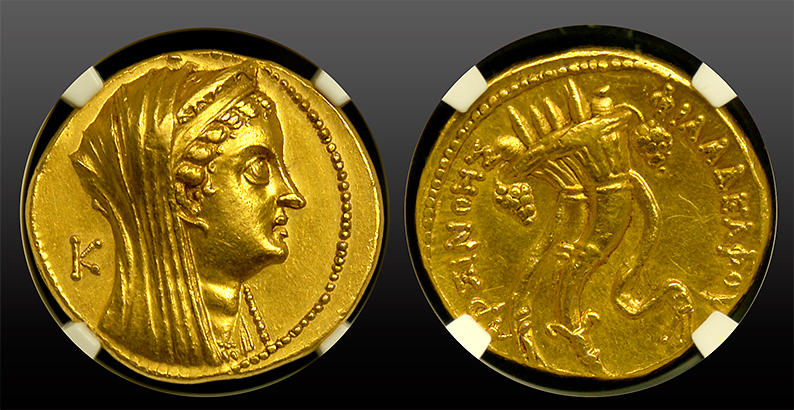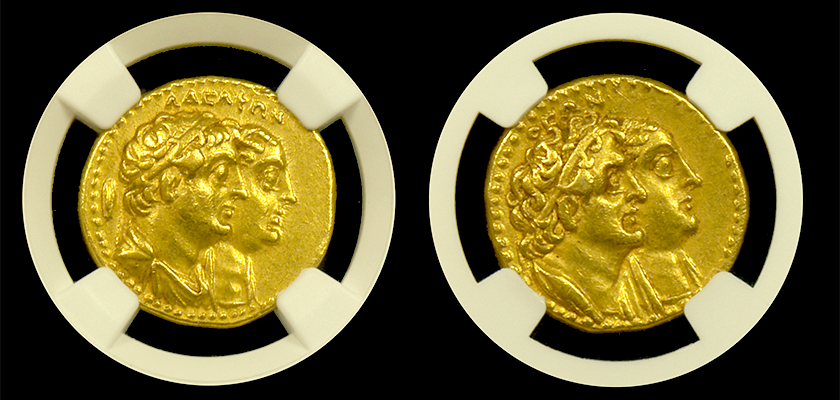The Ptolemaic Dynasty: Egypt’s Golden Age
Welcome to our journey through the illustrious history of the Ptolemaic Dynasty. Discover a captivating saga of power, wealth, and cultural splendor that unfolded amidst the sands of ancient Egypt. You’ll learn about its inception under the visionary leadership of Ptolemy I Soter. You will also subsequently learn about its eventual decline it face Roman conquest. The Ptolemaic Dynasty left an indelible mark on the annals of history. In this blog, we will delve into the multifaceted legacy of this remarkable dynasty. Moreover, exploring its economic prosperity, political influence, and artistic achievements of its magnificent coinage and enduring cultural artifacts. As we traverse the corridors of time, we will uncover the secrets of Egypt’s golden age, unraveling the mysteries of its thriving economy, flourishing trade networks, and vibrant cultural tapestry. From the bustling markets of Alexandria to the majestic temples of Karnak, each artifact unearthed offers a glimpse into the opulence and grandeur of Ptolemaic Egypt. Join us as we embark on a fascinating voyage of discovery, tracing the footsteps of pharaohs and scholars, merchants and artisans, whose legacies continue to shape our understanding of one of the most captivating periods in human history.Origins of the Ptolemaic Dynasty: Rise of Ptolemy I Soter
The Ptolemaic Dynasty traces its origins to Ptolemy I Soter, one of Alexander the Great’s most trusted generals. Following Alexander’s death in 323 BCE, Ptolemy seized the opportunity to carve out his own realm in the wake of the power vacuum left by the Macedonian conqueror. Born into a noble Macedonian family, Ptolemy possessed both military prowess and political acumen. Altogether, this made him a formidable leader in the tumultuous aftermath of Alexander’s demise. Ptolemy’s ambitions extended beyond mere conquest; he sought to establish a lasting dynasty that would endure for generations to come. To solidify his hold on power and forge strategic alliances, Ptolemy engaged in the ancient practice of dynastic marriage. Therefore, cementing bonds with influential families and ensuring the loyalty of key supporters.Arsinoe’s marriage to her brother Ptolemy

Rise to Power and Consolidation of Rule
The Ptolemaic Dynasty, originating from the ashes of Alexander the Great’s empire, owes its inception to the strategic acumen of Ptolemy I Soter. Leveraging strategic alliances and military prowess, Ptolemy I Soter firmly established control over Egypt. Markedly, laying the groundwork for a dynasty that would span generations and shape the course of history. Transitioning from the tumultuous aftermath of Alexander’s conquests, Egypt faced both internal upheaval and external threats. Amidst the chaos, Ptolemy I Soter adeptly navigated the intricate web of political rivalries and military challenges. Through skillful diplomacy and strategic marriages, he forged alliances with influential figures and solidified his authority over the Nile Delta. This period of consolidation marked the beginning of a golden age for Egypt. Particularly, characterized by stability, cultural vibrancy, and economic prosperity. In the wake of Alexander’s demise, Egypt emerged as a beacon of stability in a region plagued by uncertainty. Under Ptolemaic rule, the kingdom flourished as a center of commerce, culture, and learning. The Ptolemies, recognizing the importance of fostering trade and intellectual exchange, established Alexandria as a cosmopolitan hub, attracting scholars, artists, and traders from across the Mediterranean world. This convergence of diverse cultures and ideas fueled a renaissance in Egyptian art, literature, and philosophy, cementing the legacy of the Ptolemaic Dynasty as a golden age in the annals of history.Egypt’s Era of Economic Prosperity and Political Influence
Under Ptolemaic governance, Egypt thrived as a nexus of trade and commerce, attracting merchants from far and wide. The Nile River, with its fertile lands and strategic location, became the lifeblood of Egypt’s economy, fostering unprecedented wealth and influence. The Ptolemies implemented innovative agricultural techniques, such as irrigation systems and crop rotation, maximizing the productivity of the land. Thereby, ensuring a steady food supply for the burgeoning population. This agricultural surplus not only sustained Egypt’s populace but also provided surplus goods for export. Overall, enriching the kingdom and fueling its economic expansion. The Ptolemaic rulers sought to solidify their authority through a combination of political savvy and cultural diplomacy. They embraced Egyptian traditions and religion, presenting themselves as the legitimate successors to the pharaohs of old. This cultural assimilation endeared them to the native population and helped to maintain stability throughout the kingdom. At the same time, they cultivated alliances with foreign powers, forging strategic partnerships that bolstered Egypt’s geopolitical standing. In essence, safeguarding its borders against external threats. The opulence and power of the Ptolemaic Dynasty found expression not only in its political and economic achievements but also in its magnificent coinage which remains a testament to Egypt’s grandeur and sophistication. The Ptolemaic coinage, renowned for its artistry and craftsmanship, served as a potent symbol of royal authority and economic prosperity. Depicting the rulers in regal attire and divine poses, these coins conveyed a sense of majesty and divine sanction. Additionally, reinforcing the legitimacy of Ptolemaic rule. Moreover, they circulated widely throughout the Mediterranean world, spreading awareness of Egypt’s wealth and influence far beyond its borders.The Legacy of Ptolemaic Coinage: Artistic Mastery and Historical Significance
The coinage of the Ptolemaic Dynasty is renowned for its exquisite craftsmanship and intricate designs, reflecting the cultural richness and diversity of ancient Egypt. From gold octadrachms to bronze drachms, Ptolemaic coins served as symbols of wealth, power, and prestige, throughout the Mediterranean world. Today, the legacy of Ptolemaic coinage endures as a window into Egypt’s illustrious past. While, offering valuable insights into its culture, economy, and political dynamics. These ancient artifacts stand as enduring testaments to the splendor and majesty of Egypt’s golden age under the Ptolemaic Dynasty.The Ptolemaic Dynasty: Conclusion:
In conclusion, the Ptolemaic Dynasty stands as a shining example of Egypt’s cultural and economic achievements. From its humble origins under Ptolemy I Soter to its peak of power and influence, the dynasty made significant contributions. These encompassed art, commerce, and governance, captivating scholars and enthusiasts. Through its magnificent coinage and enduring legacy, the Ptolemaic Dynasty remains an indelible symbol of Egypt’s golden age.Explore our Egyptian Coin page to discover our latest collection of Ancient Egyptian Coins. If you don’t find what you’re seeking, reach out to us, and we’ll do our best to accommodate your request. Contact us at 1-800-928-6468 to speak with an Austin Ancient Coins Advisor today

